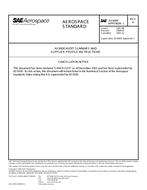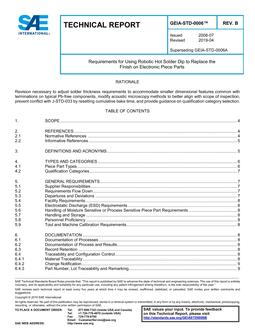Click here to purchase
This document has been declared “Stabilized” and will no longer be subjected to periodic reviews for currency. Users are responsible for verifying references and continued suitability or technical requirements. New technology may exist.Shortly after World War II, as aircraft became more sophisticated and power-assist, flight-control functions became a requirement, hydraulic system operating pressures rose from the 1000 psi level to the 3000 psi level found on most aircraft today. Since then, 4000 psi systems have been developed for the U.S. Air Force XB-70 and B-1 bombers and a number of European aircraft including the tornado multirole combat aircraft and the Concorde supersonic transport. The V-22 Osprey incorporates a 5000 psi hydraulic system. The power levels of military aircraft hydraulic systems have continued to rise. This is primarily due to higher aerodynamic loading, combined with the increased hydraulic functions and operations of each new aircraft. At the same time, aircraft structures and wings have been getting smaller and thinner as mission requirements expand. Thus, internal physical space available for plumbing and components continues to decrease.In the 1960s, the U.S. Navy began a methodical process of developing lightweight hydraulic systems (LHS) for aircraft. The Navy was keenly aware that aircraft designers would be faced with requirements for higher horsepower hydraulic systems in future high-performance, high-density aircraft. The Air Force has also pursued the use of LHS to complement their Fire Resistant Hydraulic Systems program. One logical way to achieve smaller and lighter weight hydraulic components is to raise the system operating pressure levels. Studies conducted under both Navy and Air Force programs have indicated that 8000 psi hydraulic systems are feasible and can achieve significant weight reduction and space savings for certain aircraft. Many of the hardware elements necessary for 8000 psi hydraulic systems have been designed, fabricated, and tested in the programs discussed herein. The purpose of this document is to outline experience and test results to date when operating hydraulic systems at 8000 psi.
Product Details
- Published:
- 11/15/2012
- File Size:
- 1 file , 33 MB


